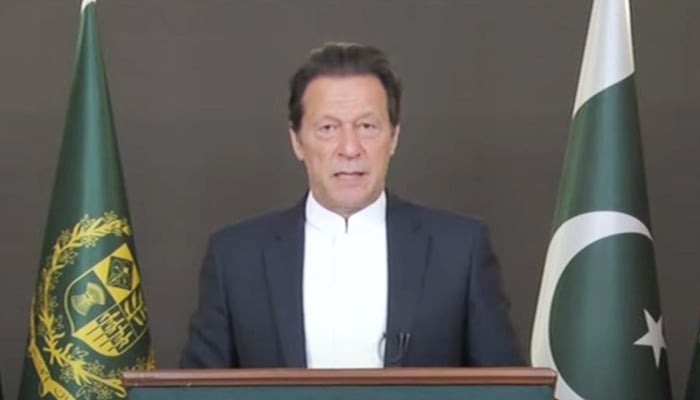PM Imran Khan announces Rs120bn package to cushion impact of inflation
Under targeted subsidy, citizens can avail 30% discount on ghee, wheat, and pulses
ISLAMABAD: Prime Minister Imran Khan on Wednesday announced a "historic welfare package" worth Rs120 billion package, as the government aims to mitigate inflation and provide relief to the masses.
The premier, addressing the nation, said that considering that the masses are undergoing a tough time due to the inflation in the country, the government is introducing a package for 20 million families, which will — in turn — benefit 130 million Pakistanis.
"This [poverty alleviation] package, which is worth Rs120 billion, will be offered to Pakistanis by the federal and provincial governments," he said.
The premier announced that under the package, citizens will be able to avail a 30% discount for six months on three basic edible items, including ghee, wheat, and pulses, under targeted subsidy.
The premier said that under the package, interest-free loans of up to Rs500,000 will be provided to city-dwellers to start businesses, while a similar amount of loan will also be provided to farmers.
The prime minister further added that the government has asked the construction sector to increase the salaries of workers, while a health-insurance programme will be introduced in Punjab from December.
"Under the package, four million families will be able to build houses without interest," the PM said, adding that Rs1,400 billion have been set aside for the Kamyab Pakistan Programme (KPP) 2021 with the aim to provide opportunities to the deserving and uplift 3.7 million households across the country.
Policies made to avoid economic collapse
The premier thanked China and Saudi Arabia for financially assisting Pakistan and said that had the country become a defaulter of the International Monetary Fund (IMF), the rupee would have depreciated more and inflation would have skyrocketed.
The prime minister also shed light on the coronavirus situation across the world and said that, unlike other countries, the Pakistani government made strategic decisions related to the imposition of a lockdown and saved factories from closing down and agricultural activities were continuing as usual.
Increase in production
"[Due to the government's policies], cotton production had increased by 81%, while record-breaking motorcycle and tractor sales were witnessed in the country.
"Urea was used 23% more by the farmers, indicating that the conditions were getting better. And when the farmers are happy, the production increases, and in return, it benefits the country," he said.
In construction, there are Rs600 billion projects underway, as we had incentivised it, he said, adding that in the industrial sector, the large scale manufacturing had increased by 13% — more money and more jobs in the country.
"We had [allowed] construction industry to operate; we tried to save our exports as if they would have stopped, then the dollar would have gone up against the rupee," he said.
Due to the government's policies, rice production had gone up by 13.6%, corn 8%, sugarcane 22%, and wheat 8%.
Talking about the increase in profits of several industrial sectors, he said engineering witnessed an increase of 350% in their profits, textile 163%, cars 131%, cement 113%, oil and gas 75%.
The premier said electricity consumption had increased by 13%, indicating that the industry was growing. The prime minister stated that the tax revenue was increasing, which showed that our economic indicators are on the right track.
In information and technology, the prime minister said the sector had witnessed a growth of 47%, while in the current year, it is expected to grow by 75%. "This is a good thing for our youth".
"Our policies prevented the economy from collapsing," he said.
'Yes, we are facing inflation'
Speaking about the ongoing inflation in the country, he told the media outlets that while it is their right to criticise the government, they should opt for a balanced approach when reporting on inflation.
Citing the example of Turkey, Germany, China, and the United States, the premier said that after 2008, these countries had also faced historic inflation.
"What can we do if inflation is being driven because of global factors?" the premier questioned as he cited the examples of oil and gas prices worldwide.
"Yes, we are facing inflation in the country but you should also look at what the government is doing to alleviate the situation," he said, adding that due to factors which is not in the hands of the government, petrol prices will have to be increased further.
Citing the Bloomberg inflation index, he said that the index shows a 50% increase in inflation across the world. "Turkey's currency has depreciated by 35%, the US and Europe have been facing historically-high inflation since 2008. Similarly, China's producer price inflation has risen to a 26-year high."
Earlier, Federal Information Minister Fawad Chaudhry had disclosed that PM Imran Khan would announce the "biggest relief package of the country's history" in his address to the nation today.
Price of petrol to increase
"If we do not increase the price of petrol, the deficit will increase," the PM said, adding that global oil prices have risen by 100%, while the price of petrol in India is Rs250 per litre.
"Oil and ghee prices have doubled worldwide, and since we import these items, what can we do about the prices?" he said.
-
Security forces gun down 30 terrorists in multiple IBOs in KP: ISPR
-
MQM-P calls for new province in Sindh
-
US report validates Pakistan military edge over India: PM
-
Banned TTP poses serious threat to Pakistan security: UNSC panel
-
CM Afridi clarifies remarks on by-poll after ECP requests army deployment
-
Dubai sees 3.2m Pakistani passengers in 2025 as airport sets new milestone
-
Security forces kill 23 Indian proxy terrorists in KP's Kurram
-
Pakistan to construct island to boost oil exploration: report












